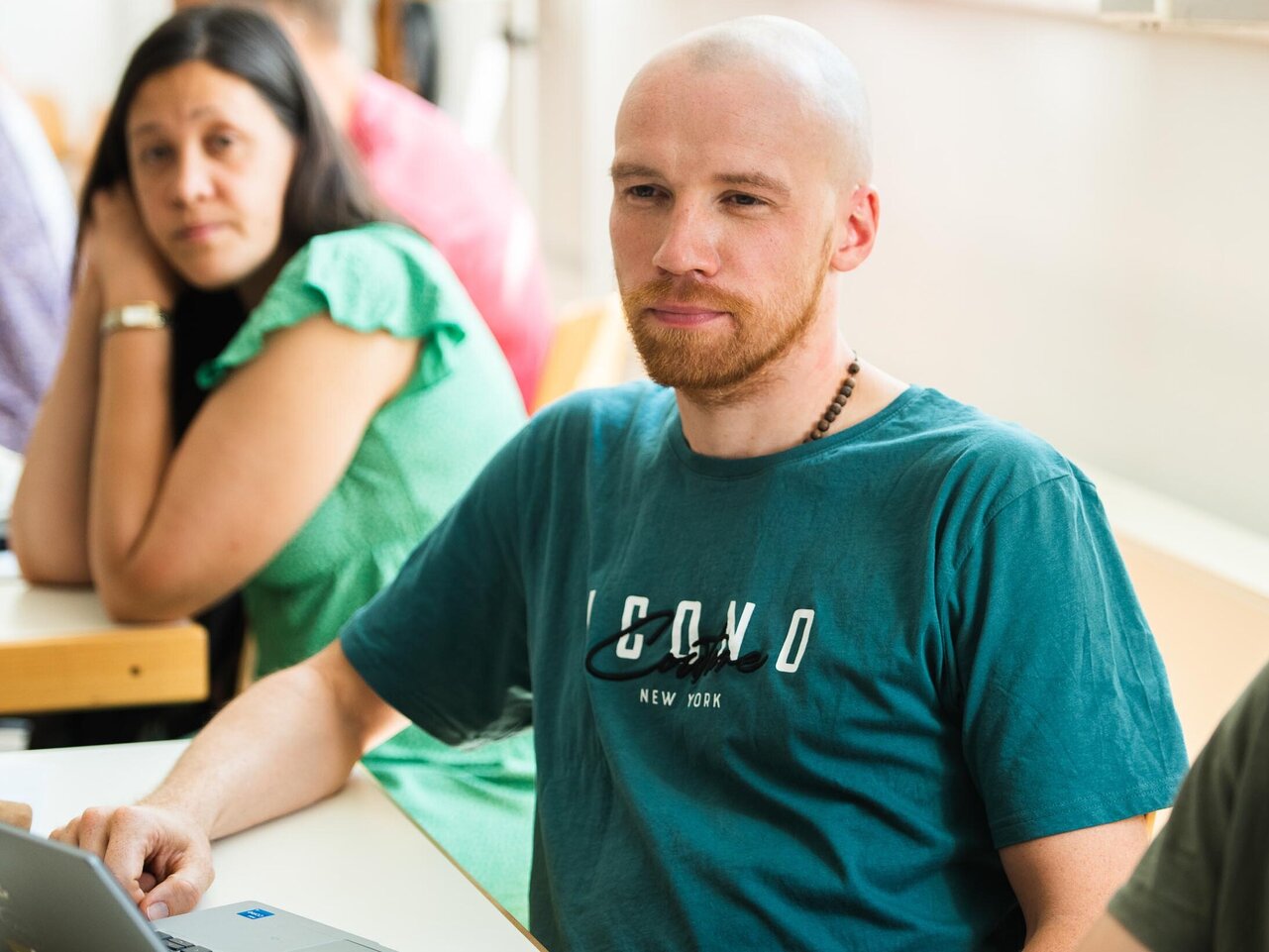Prevention and intervention: Preventing social problems through strategic action.
Preventing social problems before they arise? It would be nice! This goal is not only immediately obvious, but has always been a guiding principle of social work. However, prevention too often falls by the wayside in the day-to-day running of social services. This is precisely where this Master's programme in Preventive Social Work comes in.

Study Preventive Social Work at the KHSB
If you would like to study social work at Master's level at a university of applied sciences in Berlin, then the Master's degree programme in Preventive Social Work at the KHSB is the right place for you: Here you will deepen your scientific knowledge of social work and related sciences and relate this to conceptual questions of planning and administration of social work, as well as to preventive practices of social work. In this way, you will consolidate and expand your expertise and strengthen your ability to constantly reflect constructively and critically on the foundations of social services.
As a Master of Arts, you will qualify for activities that focus more on planning and conceptualisation. In addition, you will acquire further skills in social space orientation and practical research as well as business management start-up knowledge. You will learn to analyse social phenomena with regard to growing social inequalities.
Here you can get an overview of the content of the Master's degree programme in Preventive Social Work over the course of the semester and the study areas that are covered during the modularised study programme. Detailed information on the specific teaching and learning content of each semester can be found in the module handbook, which you can find under "Organisational matters" below.
1. Semester
- Social diagnostics and preventive social work
- Social inequality, dynamics of exclusion and processes of political change
- Prevention as a normative model and analysis of concepts of power
- Specialisation in health promotion or crime and violence prevention
- Social space orientation and practical research as cross-cutting issues
Special features
Theory-practice transfer
You don't need a university just to learn what to do in practice! Instead, we want to enable you to shape and change processes in the social services of the future. This requires not only knowledge of theoretical considerations and empirical results on the current status, but also a normative vision of where things should go in the future. We look at all three things together with you.
Commitment
The Master's in Preventive Social Work is designed as a face-to-face programme. For this reason, we emphasise regular participation in the courses. We don't just want to impart knowledge, we want to discuss it with you, debate it and weigh it up. We see professionalisation as a process of constantly developing knowledge about social problems and how to avoid them. This presupposes that you want to be involved in this process.
Responsibility
Social services and social management depend on professionals knowing what they are doing for what purpose, at what cost and with what effect. Otherwise, political justification will be difficult in the future. For this reason, we emphasise issues of practical research, quality assurance and social space orientation in this Master's degree. We see these as the basis of modern services.
Programme-specific admission requirements
The basic requirement is a first professionally qualifying university degree in social work, curative education, childhood education or another relevant university degree. A Bachelor's degree programme (according to the European Credit Transfer System [ECTS]) usually earns you 210 ECTS credit points. This means that you fulfil the admission requirements for the Master's in Preventive Social Work.
If you have completed a first professionally qualifying university degree with only 180 ECTS credit points, this is also not a problem. You can acquire the 30 ECTS credit points missing for the Master's degree from us (in accordance with § 11 of the Recognition and Credit Transfer Regulations for KHSB degree programmes (AAO)).
You may also be able to have credits credited or recognised for this. This is decided by the examination board. If you are unable to present any recognised or creditable study and examination achievements or knowledge acquired outside the university when applying, you will still be admitted.
However, this is subject to the condition that you acquire the missing credit points before the defence of your Master's thesis. The university offers you opportunities to do this.
As a university of applied sciences, the KHSB has procedures for recognising and crediting study and examination achievements and qualifications acquired elsewhere. These are designed to be as simple, transparent and binding as possible. Nevertheless, catching up on the 30 ECTS credit points required for the Master's degree programme can lead to an extension of the individual standard period of study in individual cases.
Please submit your application for credit transfer or recognition of academic achievements with your application to the KHSB. The Examination Board will decide on the application after you have enrolled.
Expertise
This full-time degree programme will provide you with the qualifications you need to work successfully in the field of preventive social work.
After completing the programme, you will have
- scientifically sound knowledge of the context of social services,
- strong knowledge in the field of practice research and practice development,
- a high level of ethical reflection skills with regard to preventive social work,
- in-depth competences in social space orientation and in linking prevention and intervention,
- sound knowledge of the respective legal foundations of the field of practice,
- Practical contacts in the field of specialisation relevant to you.
Fields of work
- in the organisation of municipal health and crime prevention measures,
- in social work to strengthen health-promoting structures at local level,
- in practical research on preventive social work,
- in crime and violence prevention, particularly in the area of child and youth welfare,
- in the organisation or management of relevant projects or organisations,
- in child protection.
Cooperations
The Master's degree programme in Preventive Social Work cooperates with various institutions in the relevant field. It aims to involve practitioners from the fields of prevention and intervention in its teaching. In the area of crime and violence prevention, the programme works closely with the Prevention Council of the State of Berlin, the State Commission "Berlin against Violence".
Further qualification
The Master of Arts degree in Preventive Social Work (M.A.) is formally equivalent to Master's degrees from universities and generally entitles the holder to a doctorate. Further details can be found in the doctoral degree regulations of the respective universities. The degree also gives you access to the higher civil service.
FAQ Preventive social work
No! As a state-recognised university of applied sciences, the Catholic University of Applied Sciences Berlin (KHSB) is not a private university, but a university under church sponsorship. In principle, anyone can study at the KHSB. The denominational affiliation or church membership of students is irrelevant. You are all very welcome.
The Master's in Preventive Social Work requires a specialisation in crime and violence prevention or prevention in healthcare. You must make this decision at the start of the programme. However, the content of the programme remains exemplary in that it is supplemented by many other subject areas. You are in no way forced to become active in exactly these areas of activity later on. Rather, you will acquire skills in these fields that you can also use elsewhere.
The degree programme is designed for 3 semesters. This means that it can be studied in this time and we as a university ensure that you can leave the university after three semesters with a Master's degree certificate, provided you have achieved the relevant grades. However, if you cannot or do not want to complete the programme in this time, this is not a problem. You can extend your programme at any time. However, please remember that the degree programme only starts in the summer semester, which means that individual seminars only take place once a year.
The Master's degree programme in Preventive Social Work is a full-time programme. As a university, we assume that you are studying 'full-time'. This is also the ratio between attendance times and self-study. In our view, it is perfectly possible to combine your studies with normal student employment. However, if you want to reliably take on more than one part-time job, this will certainly be challenging in practice.
Contact persons
Are you interested in studying with us and have questions about applying, admission requirements, campus life, enrolment or starting your studies?
Get in touch with us! Paula Schwalm, Childhood Education student, and Ahmed Abdulhay, Social Work student, will be happy to help you as part of their student peer-to-peer counselling service.






